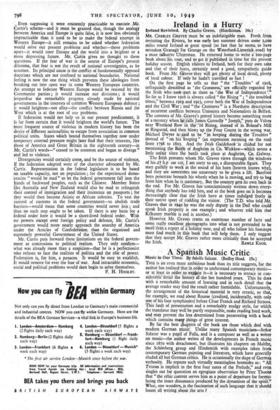Ireland in a Hurry
Ireland Revisited. By Charles Graves. (Hutchinson. 16s.)
MR. CHARLES GRAVES must be an indefatigable man. Fresh from revisiting the Riviera, he was early last summer driven some 2,000 miles round Ireland at great speed (so fast that he seems, to have mistaken Granagh far Grange on the Waterford-Limerick road) by a most talkative Ulsterman. He returned home to write a loo-page book about his tour, and to get it published in time for the present holiday season. English visitors to Ireland, both for their own sake and that of their hosts, certainly need a good, sympathetic guide book. From Mr. Gtaves they will get plenty of local detail, plenty of local colour. If -only he hadn't travelled so fast !
On the first page he tells us that "the ` Troubles ' of 1916, colloquially described as 'the Crossness are officially regarded by the Irish who took- part in them as 'the War of Independence '." So far as I know 1916 is always called "the Rising " ; "the troubled times," betweeo 1919 and 1923, cover both the War of Independence and the Civil War ; and "the Crossness" is a Northern description of recurrent conflicts between Unionists and Nationalists in Belfast. The contents of Mr. Graves's potted history become something more of a mystery when lie 'calls James Connolly "Joseph," puts de Valera near Westland Row in the '16 Rising, instead of in Boland's Mill at Ringsend, and then blows up the Four Courts in the wrong war. Michael Dwyer is said to be "in keeping during the Troubles" instead of "on his keeping" (an expression meaning on the run) from 1798 to 1,803. And the Irish Guidebook ischided for not mentioning the Battle of Aughrim in Co. Wicklow—which seems a little unfair since the battle took place at Aughrim, Co. Galway. The Irish peasants whom Mr. Graves views through the windows of his 2j h.p car cut, I am sorry to say, a disreputable figure. They start guiltily to work at the sound of his horn (heaven knows why), and they are sometimes too unsavoury to be given a lift. Barefoot boys penetrate beneath his wheels when he is moving, and try 'to beg from him when he is stationary,. But the country gets its own back in the end. For Mr. Graves has -conscientiously written down every- thing that anybody has told him, and as the book goes on it becomes increasingly clear that the Irish have at times indulged freely in their native sport of codding the visitor. (The T.D. who Sold Mi. ' Graves that in 1040 he was the only deputy in the Dail who could speak Irish properly is one example ; and whoever told him that Kilkenny marble is red is another.) However Mr. Graves crams an enormous number of facts and some really excellent photographs into what is not pretended to be more -than a report of a holiday tour, and all who follow his footsteps must find much in this book that will help them. I only suggest that they accept Mr. Graves rather more critically than he accepted


































 Previous page
Previous page